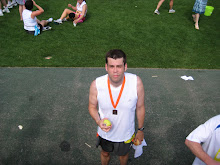Tonight I finished reading a collection of essays by Michael Chabon, Maps and Legends. The sticker on the back tells me that it is his first book of nonfiction, and then lists a bunch of the novels he has written. I've heard of them; two of them are on our bookshelves, but I haven't read them yet. I did see the film version of Wonder Boys, which I now understand was based on a novel he wrote.
Anyway, it was good. Several essays on comic books/strips, and there were a couple of rants about biases against popular genre fiction, so he had me pretty much from the time he pointed out that science-fiction gets relegated to the generic ghetto just behind the bourgeois suburb of realism. Sometimes I think he may have overstated the case just a bit--sci-fi and detective fiction have been coming up in the world of academia. But I also suspect this may come from our different perspectives. Chabon is a product of an MFA program; I'm a product of literature graduate programs. MFA students always strike me as desperate to be taken seriously; literature students--some of them anyway--always strike me as desperate not to be taken for the snobs we actually are. So literature students drop pointed references to Buffy, the X-Men, and discuss the narrative virtues of video games--even if they do their academic work on Jonathan Swift or Chaucer. MFA students keep writing earnest realism, or even more painfully earnest poetry, and turn their noses up at any narrative with a spaceship or a detective in it. Gross oversimplification, I'm sure, but I've seen enough of graduate school to suspect that it's a rough guide to how things work in your local English department.
The last essay--a kind of digression within an essay within an memoir within a religious reflection--was especially good. It's about a lot of things, but early on Chabon talks about finding a book entitled Strangely Enough! on the YA rack at his local library. The book sounds like a lot of books I remember reading avidly as a kid; the cheap paper back with chapters on UFOs, the possibility of time travel, what made the dinosaurs go extinct, Nostradamus, etc. That portion of the essay evoked some of the real pleasure that reading gave me as a child; memories of long summer afternoons, comic books, Godzilla movies on my grandmother's TV, and choose-your-own adventure books came flooding back. I've been watching some Twilight Zone reruns at night recently, and they've been producing the same effect. One of these nights the wife is going to come out and catch me reading Ray Bradbury and inhaling Fig Newtons. Oh wait. . . .
Anyway--where does that pleasure go? I still enjoy reading. I've made reading literature my life's work. But the trouble with gorging yourself, I suppose, is that you always run the risk of satiation, even cynicism. I haven't become cynical just yet--today I caught myself actually enjoying reviewing some Wordsworth poetry for a class I'm preparing for the fall. But it gets difficult to access that unalloyed pleasure of the text that you had when were a child. You catch yourself--in the middle of a hokey Star Trek rerun--reflecting on the cold war politics that must have shaped the way that the Romulans were written into that show.
But of course, that's a pleasure in and of itself too.
Subscribe to:
Post Comments (Atom)

No comments:
Post a Comment